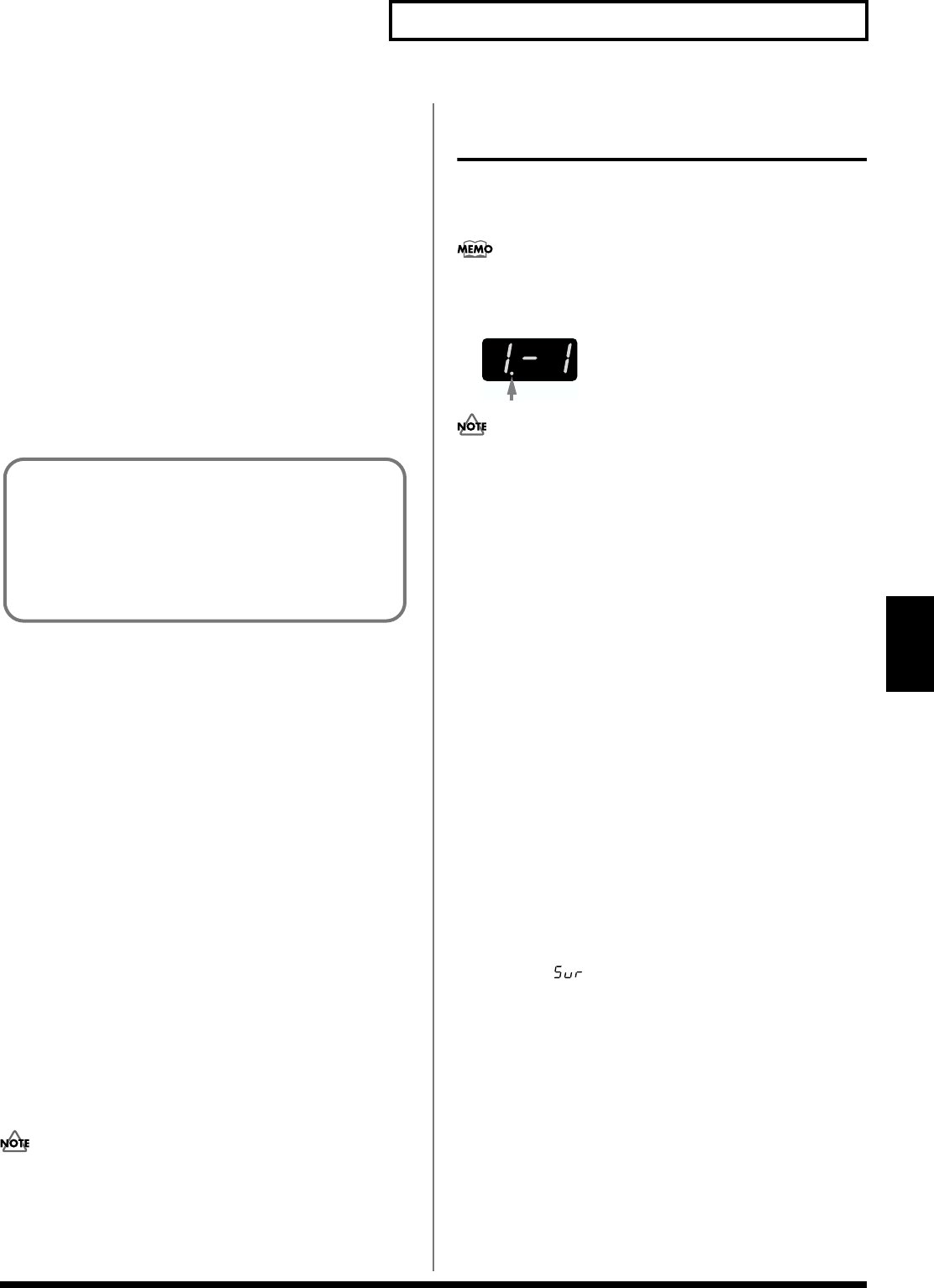
73
Chapter 5. Using in Performance Mode
Chapter 5
Making Settings for Each Patch or
Rhythm Set in the Parts
Here’s how to make the settings for the individual Patches and
Rhythm Sets in the Performance’s Parts.
1. Select the Performance containing settings you want to
change.
2. Press [1]–[4/R] (Part buttons) to select the Part to which the
Patch or Rhythm Set with the settings you want to change is
assigned.
3. The procedure for making the settings is the same as that
used in Patch mode. Refer to “Chapter 2. Creating Your Own
Sounds” (p. 52) when making the settings.
4. To save the settings, press [WRITE] and carry out the write
procedure (p. 73).
Securing the Number of Oscillators
in Each Part (Oscillator Reserve)
When the number of sounds being played exceeds the SH-32’s
maximum 32 oscillators then any further sounds are given priority,
and the sounds from the oscillators currently being played are
deleted, starting with the least recent sound and progressing in
order as more sounds are added. To prevent sounds in Parts being
played in Performance mode from being cut off due to the sounds
being deleted, you can set the minimum number of oscillators to be
maintained for individual Parts. For example, when the Oscillator
Reserve for Part 1 is set to “10,” then even if all 32 oscillators are in
use, ten oscillators remain reserved for use by Part 1.
1. Confirm that the SH-32 is in Performance mode.
2. Hold down [PATCH/PERFORM] and press [EXIT].
Both buttons blink, and the SH-32 switches to Part Assign mode.
3. Press [1]–[4/R] (Part buttons) to select the Part whose
Oscillator Reserve settings you want to make.
4. Press [OSC 1], causing the indicator to blink.
5. Press [VALUE ▼/▲] to set the number of oscillators (0–32)
you want to reserve for that Part.
You cannot make settings that would result in a combined total
of more than 32 oscillators reserved for all of the Parts.
6. Press [EXIT] to return to Performance mode.
7. To save the settings, press [WRITE] and carry out the write
procedure.
Saving Changed Settings
(WRITE)
Changes in settings are temporary, and are lost when the power is
turned off or when you select another tone. To keep the settings you
have modified, save them to the SH-32’s User Memory.
A dot appears in the display when a Performance’s settings are
changed. The dot disappears when the settings are saved to the
SH-32.
fig.05-03
Any data currently stored in the location to which the new data
is being saved is overwritten, and therefore lost, when the write
procedure is executed. However, the factory setting data can be
recovered by performing the Factory Reset procedure (p. 94).
1. Make sure that Performance you wish to save is selected.
2. Press [WRITE] to make the indicator light.
The Performance number blinks in the display.
3. Specify the save-destination Performance with the same
procedure previously used in selecting the Performance (p.
71).
4. Press [WRITE] once again.
The [WRITE] and [PATCH/PERFORM] indicators blink. Once
“Pt1” (Part 1) appears blinking in the display, if the settings for
the Patch assigned to Part 1 are changed, then that Patch number
blinks in the display. If the settings for the Part 1 Patch are not
changed, then “---” blinks in the display.
5. If the Patch settings are changed, then specify a Patch for
the save destination. If you don’t want to save the Patch
settings, then press the button for the Part that is to be
saved, causing the button to light up.
6. Repeat Steps 4 and 5 to carry out the same process for Parts
2 through 4.
7. When you have finished with the procedure up to Part 4, the
message “ ” (Sure?) blinks in the display, prompting
you to confirm the save.
8. Press [WRITE] once more to execute the save. To cancel the
save, press [EXIT].
Other Performance-Related Settings
For more information on the following procedures and settings
in Performance mode, refer to the pages listed.
• Using the Effects → (p. 66)
• Using Arpeggiator → (p. 80)
• Using the Chord Memory Function → (p. 82)
